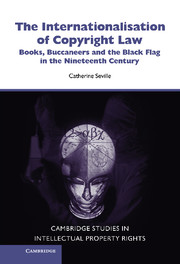 The Internationalisation of Copyright Law
The Internationalisation of Copyright Law Book contents
- Frontmatter
- Contents
- Table of cases
- Table of statutes
- Table of abbreviations and archive sources
- Acknowledgements
- 1 Introduction
- 2 International copyright: four interconnected histories
- 3 Towards the Berne Union
- 4 Colonial challenges
- 5 The independence of America
- 6 Domestic problems
- 7 The colours of cyberspace
- Bibliography
- Index
4 - Colonial challenges
Published online by Cambridge University Press: 25 July 2009
- Frontmatter
- Contents
- Table of cases
- Table of statutes
- Table of abbreviations and archive sources
- Acknowledgements
- 1 Introduction
- 2 International copyright: four interconnected histories
- 3 Towards the Berne Union
- 4 Colonial challenges
- 5 The independence of America
- 6 Domestic problems
- 7 The colours of cyberspace
- Bibliography
- Index
Summary
The book trade in Canada – origins and development
The first printing press in what would later become British North America was brought to Halifax, Nova Scotia, from Boston in 1751. A second press was brought to Quebec in 1764, just after the formal recognition of British rule in the Treaty of Paris (1763). The European population in 1761 was just under 76,000. There was rapid settlement of all six eastern provinces by American and British settlers, many of whom were accustomed to having newspapers and books in their homes. At the end of the Napoleonic Wars the country had nineteen printing presses, stretching from St John's, Newfoundland to the Niagara frontier. Under the mercantile system, colonies were in a subordinate economic position to the mother country, which expected to have the exclusive right to sell her products (particularly manufactured goods) in colonial markets. Colonies were not encouraged to develop industries which might compete. As a result, the book trade was organised to import books and periodicals. Most British North Americans had little time or money for books. Late eighteenth-century literacy rates were low, especially among the poor and farmers, though there were efforts (particularly from missionaries) to change this. A handful of booksellers imported works for a small, select group of readers: government servants, garrison officers, clergy, teachers, merchants and ladies. American books, newspapers and periodicals also circulated. Montreal led the retail bookselling trade in the early decades of the nineteenth century.
- Type
- Chapter
- Information
- The Internationalisation of Copyright LawBooks, Buccaneers and the Black Flag in the Nineteenth Century, pp. 78 - 145Publisher: Cambridge University PressPrint publication year: 2006
